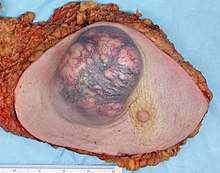Alcohol and breast cancer
The relationship between alcohol and breast cancer is clear: drinking alcoholic beverages, including wine, beer, or liquor, is a risk factor for breast cancer, as well as some other forms of cancer.[1][2][3] Drinking alcohol causes more than 100,000 cases of breast cancer worldwide every year.[3]
The International Agency for Research on Cancer has declared that there is sufficient scientific evidence to classify alcoholic beverages a Group 1 carcinogen that causes breast cancer in women.[2] Group 1 carcinogens are the substances with the clearest scientific evidence that they cause cancer, such as smoking tobacco.
A woman drinking an average of two units of alcohol per day has 8% higher risk of developing breast cancer than a woman who drinks an average of one unit of alcohol per day.[4] Even light consumption of alcohol – one to three drinks per week – increases the risk of breast cancer.[3]
Heavy drinkers are also more likely to die from breast cancer than non-drinkers and light drinkers.[3][5] Also, the more alcohol a woman consumes, the more likely she is to be diagnosed with a recurrence after initial treatment.[5]
Mechanism

The mechanisms of increased breast cancer risk by alcohol are not clear, and may be:
- Increased estrogen and androgen levels[6]
- Enhanced mammary gland susceptibility to carcinogenics[6]
- Increased mammary DNA damage[6]
- Greater metastatic potential of breast cancer cells[6]
Their magnitude likely depends on the amount of alcohol consumed.[6]
Susceptibility to the breast cancer risk of alcohol may also be increased by other dietary factors, (e.g. folate deficiency), lifestyle habits (including use of hormone replacement therapy), or biological characteristics (e.g. as hormone receptor expression in tumor cells).[6]
In daughters of drinking mothers
Studies suggest that drinking alcohol during pregnancy may affect the likelihood of breast cancer in daughters. "For women who are pregnant, ingestion of alcohol, even in moderation, may lead to elevated circulating oestradiol levels, either through a reduction of melatonin or some other mechanism. This may then affect the developing mammary tissue such that the lifetime risk of breast cancer is raised in their daughters."[7]
Light and moderate drinking
Light drinking is one to three alcoholic drinks per week, and moderate drinking is about one drink per day. Both light and moderate drinking is associated with a higher risk of being diagnosed with breast cancer.[3][8] However, the increased risk caused by light drinking is small compared to heavy drinking.
Recurrence
Drinking or not drinking alcohol does not solely determine whether breast cancer will recur after treatment.[5] However, the more a woman drinks, the more likely the cancer is to recur.[5]
In men
In men, breast cancer is rare, with an incidence of fewer than one case per 100,000 men.[9] Population studies have returned mixed results about excessive consumption of alcohol as a risk factor. One study suggests that alcohol consumption may increase risk at a rate of 16% per 10g daily alcohol consumption.[10] Others have shown no effect at all, though these studies had small populations of alcoholics.[11]
Epidemiology
Worldwide, alcohol consumption causes approximately 144,000 women to be diagnosed with breast cancer each year.[3] Approximately 38,000 women die from alcohol-induced breast cancer each year.[3] About 80% of these women were heavy or moderate drinkers.[3]
References
- ↑ Hayes, J.; Richardson, A.; Frampton, C. (November 2013). "Population attributable risks for modifiable lifestyle factors and breast cancer in New Zealand women". Internal Medicine Journal. 43 (11): 1198–1204. doi:10.1111/imj.12256. ISSN 1445-5994. PMID 23910051.
- 1 2 Alcohol consumption and ethyl carbamate International Agency for Research on Cancer Working Group on the Evaluation of Carcinogenic Risks to Humans (2007: Lyon, France) ISBN 9789283212966
- 1 2 3 4 5 6 7 8 Shield, Kevin D.; Soerjomataram, Isabelle; Rehm, Jürgen (June 2016). "Alcohol Use and Breast Cancer: A Critical Review". Alcoholism, Clinical and Experimental Research. 40 (6): 1166–1181. doi:10.1111/acer.13071. ISSN 1530-0277. PMID 27130687.
- ↑ Non-Technical Summary Archived 24 July 2006 at the Wayback Machine. Committee on Carcinogenicity of Chemicals in Food Consumer Products and the Environment (COC)
- 1 2 3 4 Gou, YJ; Xie, DX; Yang, KH; Liu, YL; Zhang, JH; Li, B; He, XD (2013). "Alcohol Consumption and Breast Cancer Survival: A Meta-analysis of Cohort Studies". Asian Pacific journal of cancer prevention : APJCP. 14 (8): 4785–90. PMID 24083744.
Although our meta-analysis showed alcohol drinking was not associated with increased breast cancer mortality and recurrence, there seemed to be a dose-response relationship of alcohol consumption with breast cancer mortality and recurrence and alcohol consumption of >20 g/d was associated with increased breast cancer mortality.
- 1 2 3 4 5 6 Singletary KW, Gapstur SM (2001). "Alcohol and breast cancer: review of epidemiologic and experimental evidence and potential mechanisms". JAMA. 286 (17): 2143–51. doi:10.1001/jama.286.17.2143. PMID 11694156.
- ↑ Stevens RG, Hilakivi-Clarke L (2001). "Alcohol exposure in utero and breast cancer risk later in life". Alcohol and Alcoholism. 36 (3): 276–7. doi:10.1093/alcalc/36.3.276. PMID 11373268.
- ↑ Zhang SM, Lee IM, Manson JE, Cook NR, Willett WC, Buring JE (March 2007). "Alcohol consumption and breast cancer risk in the Women's Health Study". Am J Epidemiol. 165 (6): 667–76. doi:10.1093/aje/kwk054. PMID 17204515.
- ↑ Male Breast Cancer
- ↑ Guénel, P.; Cyr, D.; Sabroe, S.; Lynge, E.; Merletti, F.; Ahrens, W.; Baumgardt-Elms, C.; Ménégoz, F.; Olsson, H.; Paulsen, S.; Simonato, L.; Wingren, G. (Aug 2004). "Alcohol drinking may increase risk of breast cancer in men: a European population-based case-control study". Cancer causes & control : CCC. 15 (6): 571–580. doi:10.1023/B:CACO.0000036154.18162.43. ISSN 0957-5243. PMID 15280636.
- ↑ Brinton, A.; Richesson, A.; Gierach, L.; Lacey Jr, R.; Park, Y.; Hollenbeck, R.; Schatzkin, A. (Oct 2008). "Prospective evaluation of risk factors for male breast cancer". Journal of the National Cancer Institute. 100 (20): 1477–1481. doi:10.1093/jnci/djn329. ISSN 0027-8874. PMC 2720728. PMID 18840816.
External links
- UK: Committee on Carcinogenicity of Chemicals in Food, Consumer Products Consumption of alcoholic beverages and risk of breast cancer
- UK: Committee on Carcinogenicity of Chemicals in Food, Consumer Products Evidence for association between consumption of alcoholic beverages and breast cancer